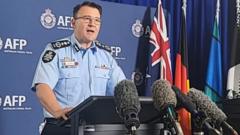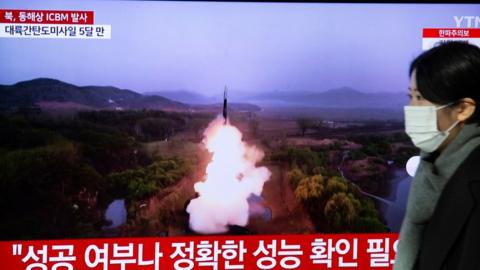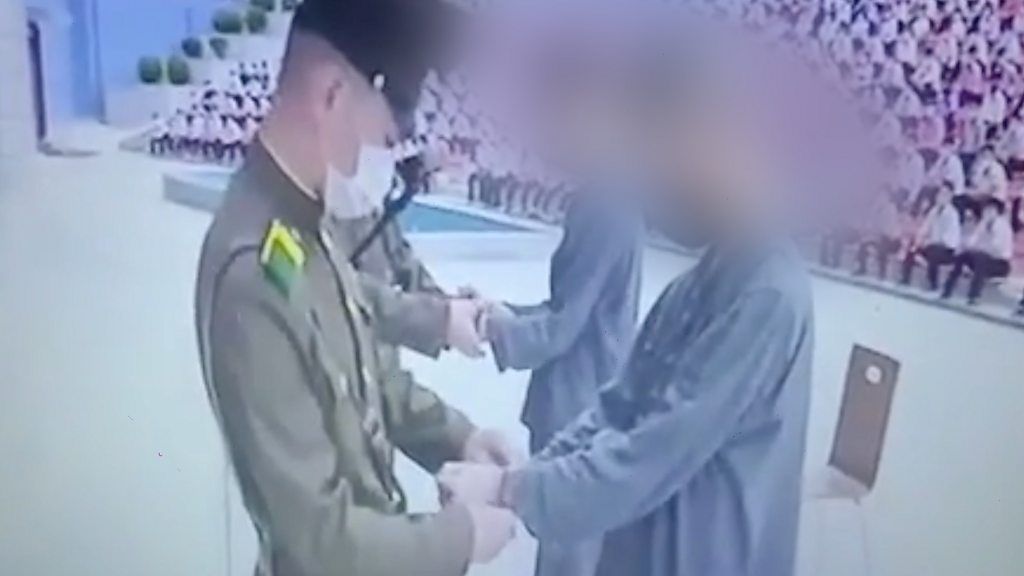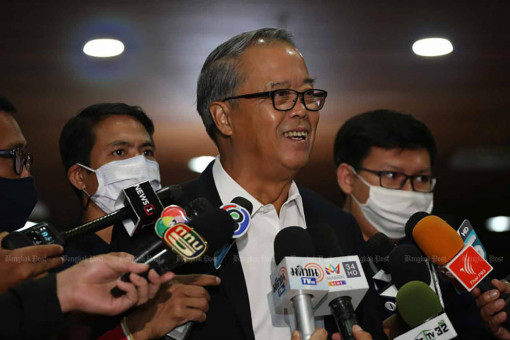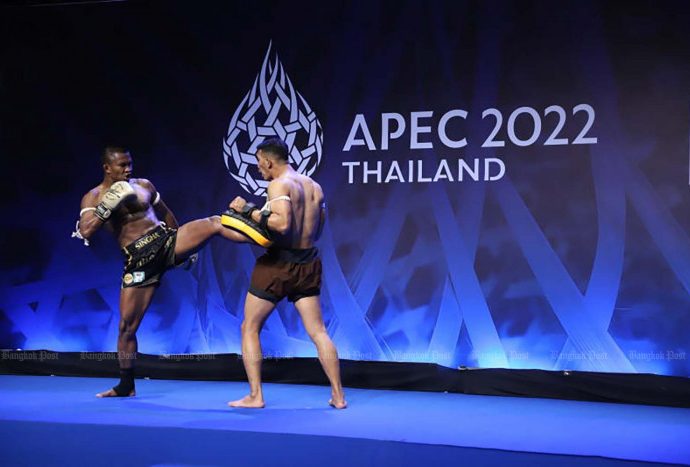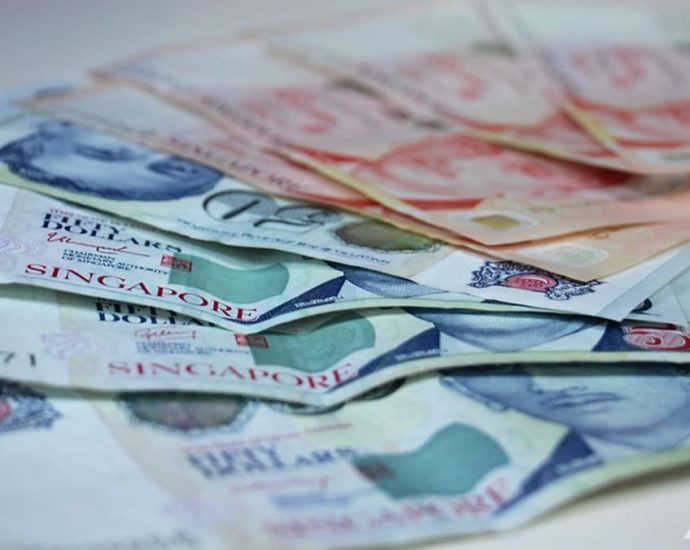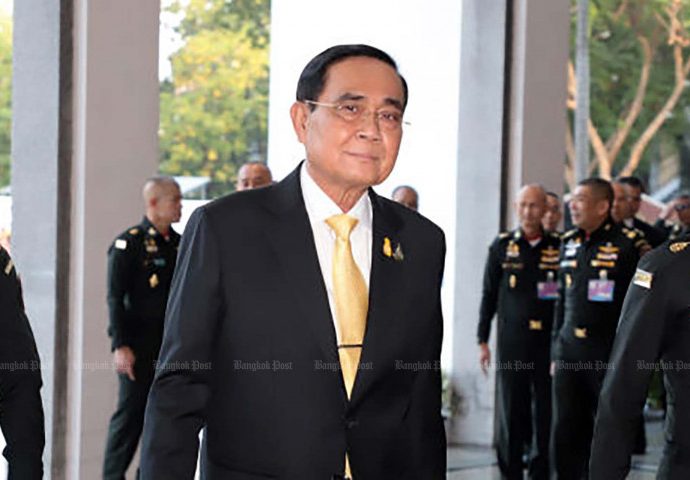Medibank hack: Russian sanctioned over Australia’s worst data breach
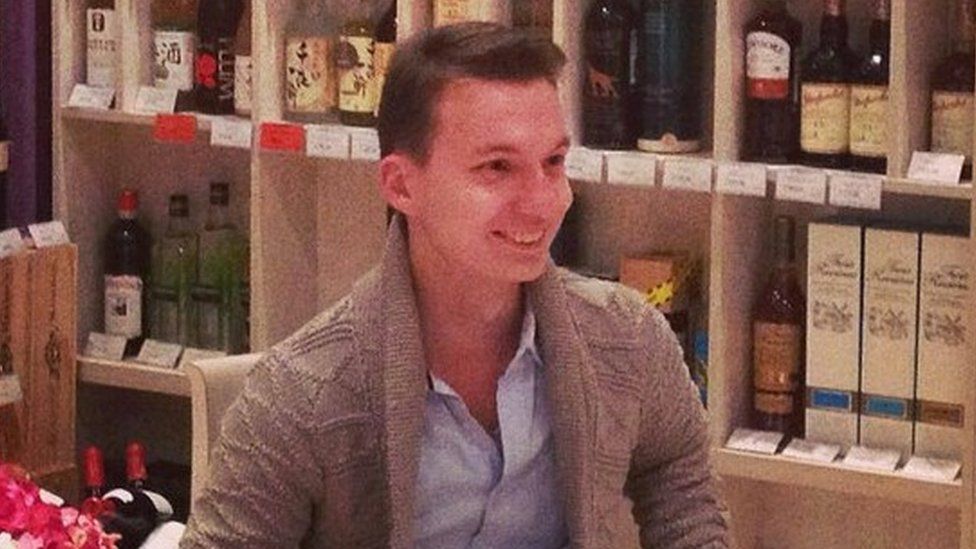 DFAT
DFATA Russian man has been named and sanctioned for his role in Australia’s worst data breach.
The personal information of 9.7m Australians was stolen from the country’s largest health insurer, Medibank, in late 2022.
Sensitive documents, including abortion records, were then posted online.
The cyber sanctions – the first of their kind in Australia – include financial penalties and a travel ban for Aleksandr Ermakov.
Little has been made public about Mr Ermakov, but Australian intelligence authorities say he is part of the infamous Russian cyber-crime gang REvil – which has been linked to attacks across Europe, the US and UK.
Announcing the measures on Tuesday, Home Affairs Minister Clare O’Neil described the Medibank hack as “the single most devastating cyber-attack we have experienced as a nation”.
“Literally millions of people having personal data about themselves, their family members, taken from them and cruelly placed online for others to see,” she said.
“These people are cowards and scumbags… we’ll unveil who you are and we’ll make sure you’re accountable.”
Authorities are still investigating the breach, Ms O’Neil added, and more people may face penalties.
It is the first time the government has used cyber sanctions legislation, passed in 2021, which applies financial punishments to people involved in significant online attacks.
Australia has faced a string of large data breaches in recent years, but few – if any – have rocked the country like the Medibank hack.
The cyber criminals had stolen login details which granted them access to all of Medibank’s customer data – including the medical records of everyone from athletes and media figures to the Prime Minister Anthony Albanese.
They began posting the data online after the insurer – with the government’s support – refused to pay a ransom.
They first released a set of files named “good-list” and “naughty-list” which contained, among other things, people’s health claims data – including records of treatment for mental health or addiction – as well as names, addresses, birthdates, and government ID numbers. Soon after they posted: “added one more file abortions.csv…”, about some customer’s end of pregnancy procedures.
Medibank at the time apologised for what it called the “malicious weaponisation” of private information, with CEO David Koczkaro warning that the data release could stop people from seeking medical assistance.
Several class actions – which argue the firms should have better protected such sensitive data – have since been launched.
Related Topics
-
-
11 November 2022

-
-
-
10 November 2022

-
-
-
29 September 2022

-
Umar Khalid: Indian activist languishes in jail without bail or trial
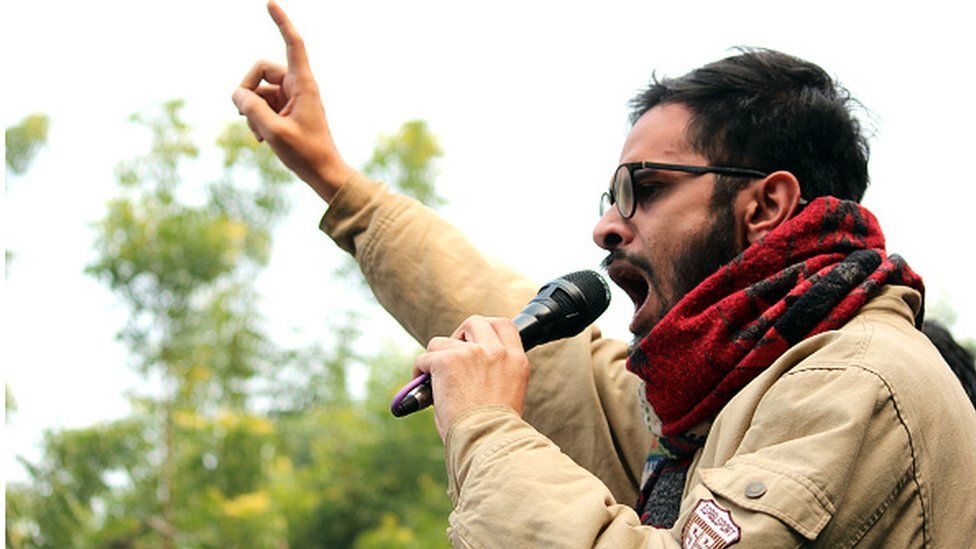 Getty Images
Getty ImagesIn an interview in January 2020, Umar Khalid introduced himself as an “unemployed 32-year-old Indian”, with a doctorate on indigenous people from a prestigious university.
“Ideologically, you could say, I’m a radical democrat. I believe in democracy, and I believe in democracy that is not limited until your voting,” Mr Khalid told VICE Asia.
“It must come into practice in everyday life in a way you can voice your issues and concerns with democratic functioning.”
Mr Khalid had already gained prominence in 2016 as one of five Indian students charged with sedition for organising a protest at his alma mater, Delhi’s Jawaharlal Nehru University (JNU), over the 2013 hanging of a Kashmiri man.
He, along with another student, had surrendered to the police and had been granted bail months later. In 2022, the Supreme Court temporarily suspended the colonial sedition law, instructing the government to halt all trials until the law’s validity was conclusively determined by the court.
Four years later, in September 2020, Mr Khalid was arrested again and accused of being a “key conspirator” in violent clashes in Delhi that killed 53 people, mostly Muslims. The February riots in the Indian capital occurred amid massive months-long protests against a contentious citizenship law.
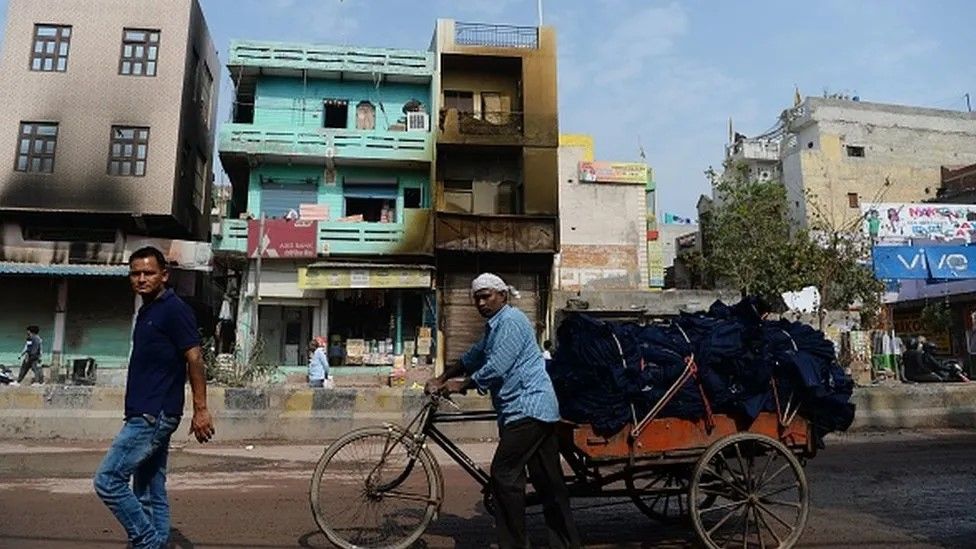
Since then the activist has been languishing in a maximum security prison in the city. Mr Khalid, who was one of several students and activists held for the violence, has denied the charges against him. The 36-year-old says he only took part in a peaceful protest.
Two police cases were lodged against Mr Khalid. One case has been dropped, while in the other, he hasn’t been charged in court yet, and the trial hasn’t begun. Denied bail twice in the second case, he has faced prolonged incarceration as the police invoked the Unlawful Activities (Prevention) Act (UAPA) – a stringent anti-terror law notorious for making it exceptionally challenging to get bail, often resulting in years of detention until the completion of trial.
In May last year, Mr Khalid’s lawyers sought bail from the Supreme Court. Despite 11 scheduled dates over the past eight months, the top court has not yet heard the bail petition.
Lawyers on both sides were occasionally absent; at other times, changes in the bench hearing the case prolonged the delay. Kapil Sibal, Mr Khalid’s lawyer, has told the court that he would need only “20 minutes” to show that the police did not have a case against his client. The next hearing is set for 24 January, with the judge insisting that the proceedings must commence on that day.
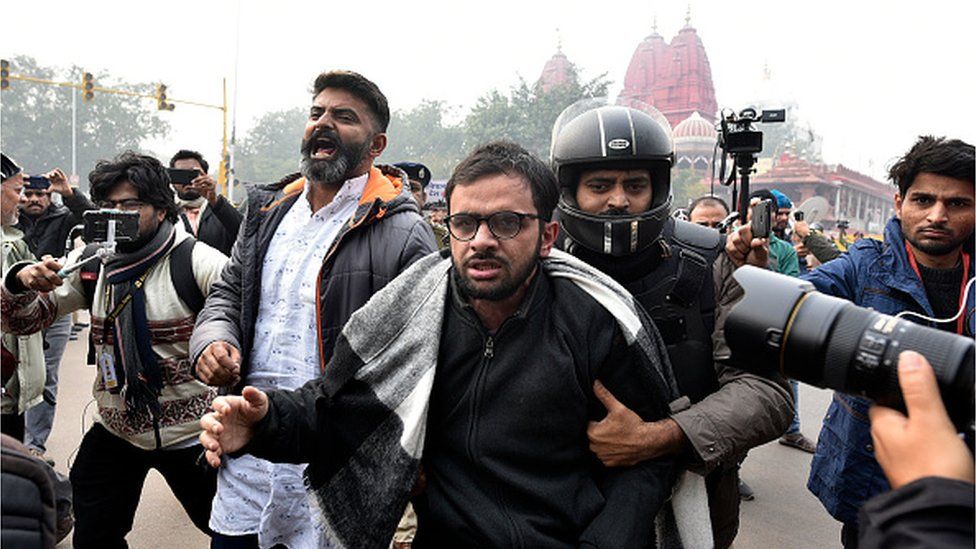
The prosecutor said Mr Khalid was identified meeting people accused in the rioting by a witness. His lawyer argued that Mr Khalid was neither present in Delhi when the violence broke out, nor was there any other evidence to link him to the crime.
Under the UAPA, the activist has been charged by police with a “larger conspiracy” of terrorism, criminal conspiracy and engaging in unlawful activities, along with charges of rioting.
The police has described him as a “remote supervisor” and “mastermind” behind the riots, relying on what they said were statements made by unnamed witnesses, Mr Khalid’s membership of WhatsApp groups, phone calls made to him by other accused when the riots began and his presence at various demonstrations.
They also say that unnamed witnesses have told them Mr Khalid supported the overthrow of the Narendra Modi government, making provocative speeches. While denying him bail, the Delhi high court also said that Mr Khalid had called for a revolution, which may not “necessarily” be bloodless. Mr Khalid has consistently denied making any provocative speeches or instigating violence.
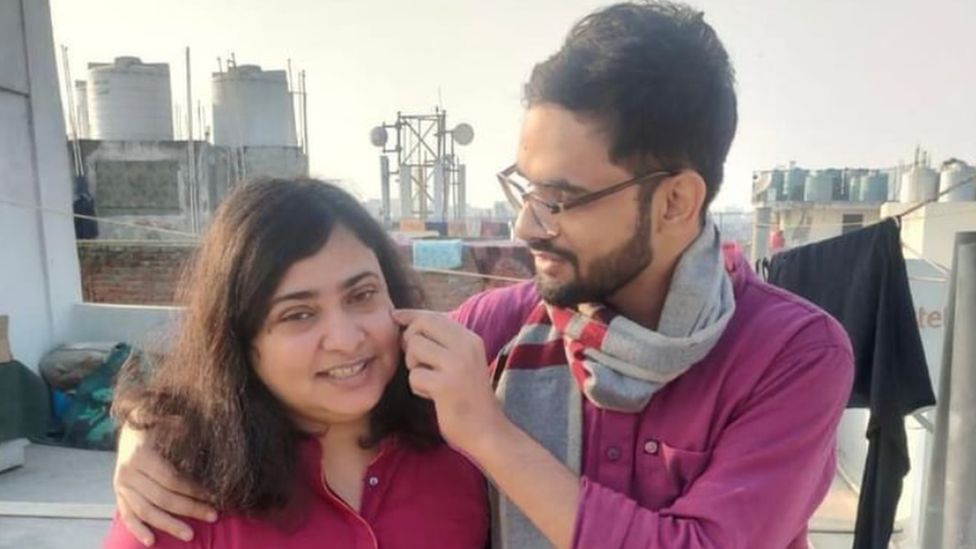
The trial court and the Delhi high court, which have denied him bail, are not convinced; they believe the allegations against Mr. Khalid are, on the face of it, true.
Legal commentators say the evidence produced against Mr Khalid is “weak”.
In October 2022, a former Supreme Court judge, three retired high court judges, and a former federal home secretary examined the UAPA case against Mr Khalid as part of a larger report on the riots. They wrote that they found no substantiating evidence to warrant the imposition of terrorism charges.
The prosecution “relies on material that is intrinsically unreliable in law”, they wrote. They found inconsistencies in the claims made by the police which “further corroborates the possibility that the witness statements gathered have been fabricated”.
“The prosecution really needs to make up its mind as to what is the case against me,” Mr Khalid’s lawyer told a court in 2022, challenging refusal of bail. “I have to bear the brunt of two years of imprisonment because you have a [hearsay] statement [from an uncorroborated witness].”
Amnesty International has said that denying bail to Mr Khalid is a “huge blow to free expression and peaceful assembly in the country”. The rights group said it reflected a “rapidly shrinking space for critical voices”, setting a “chilling precedent” for dissenting views.
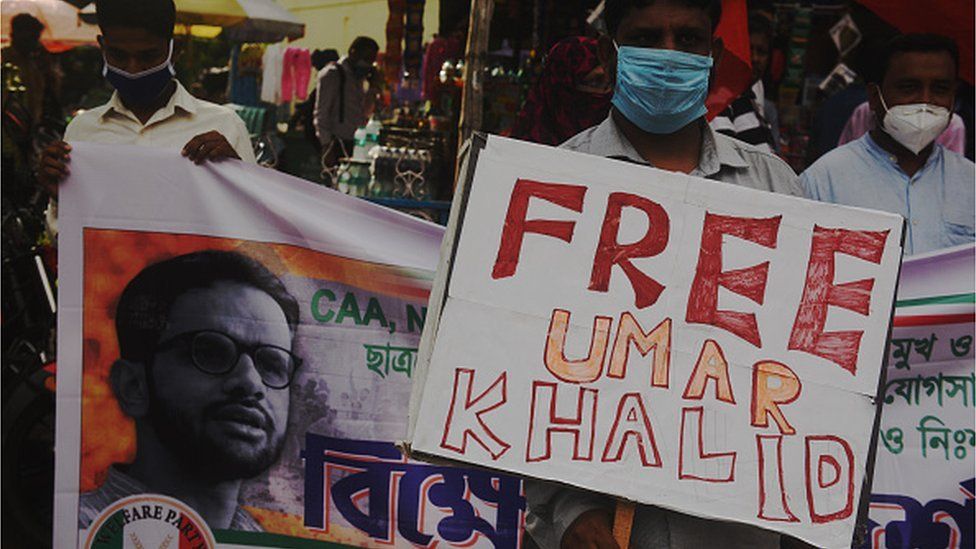
Meanwhile, in prison, Mr Khalid reads voraciously, writes applications for fellow prisoners, and watches cricket on the TV. He also writes diligently, aiming to craft a prison diary of sorts that has already piqued the interest of publishers.
Mr Khalid’s family is allowed a 20-minute video call each week, and his friends can have a half-hour physical visit at the prison. The family is holding up: after years of editing an Urdu newspaper, his father launched a small political party, while his mother, who used to work as a doctor, now runs a boutique. In July 2022, they had a brief respite: Mr Khalid was granted temporary bail for a week to attend his sister’s wedding.
“It is not a very hopeful situation. But Umar is fine, keeping his spirits up,” says Banojyotsna Lahiri, Mr Khalid’s long-time partner. The two met as students in 2008 and started dating five years later.
Ms Lahiri has written evocatively of how the two have been in a “long-distance relationship while being in the same city”, meeting across a glass partition in prison and talking on the intercom.
“We laugh, joke and don’t discuss sad things… He calls me too, and we have court dates, pun intended. In court we talk in sign language,” she told India Love Project, an Instagram account celebrating unions that defy “the shackles of faith, caste, ethnicity, and gender.”
Last week, Ms Lahiri visited Mr Khalid in prison with six new books, including Paul Lynch’s Booker-winning Prophet Song, William Styron’s Sophie’s Choice, and works by Saadat Hasan Manto and a book on Urdu poet Mirza Ghalib. She reckons Mr Khalid has read close to 200 books in incarceration, and she has bought bookshelves to store the ones he returns after reading.
In his prison ward, where he’s permitted to leave his cell during the day, Mr Khalid shares space with convicted criminals, including murderers and those guilty of other heinous crimes.
“Why am I here among all these people?” he often asks Ms Lahiri during their meetings.

Read more India stories from the BBC:

Related Topics
Kim Jong Un: Is North Korea’s leader actually considering war?
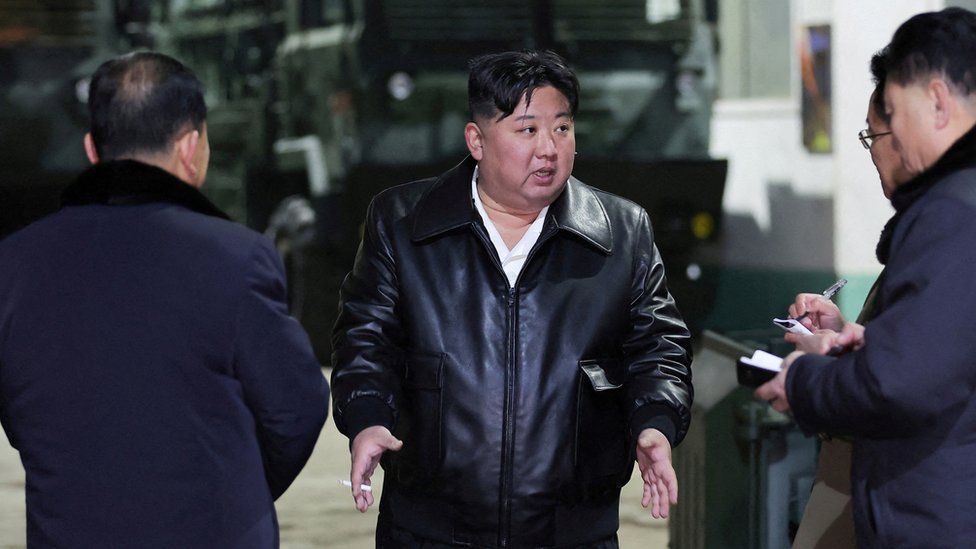 KCNA
KCNANorth Korea experts – by nature, a cautious group who seek to avoid sowing panic – have been left reeling by two of their own.
Last week, the two eminent analysts dropped a bomb – so to speak – in stating their belief that the pariah state’s leader is preparing for war.
Kim Jong Un has scrapped the bedrock goal of reconciling and re-uniting with South Korea, they said. Instead, he’s presenting the North and South as two independent states at war with each other.
“We believe, that like his grandfather in 1950, Kim Jong Un has made a strategic decision to go to war,” wrote Robert L Carlin, a former CIA analyst and Siegfried S Hecker, a nuclear scientist who’s visited the North several times, in an article on specialist site 38 North.
Such a pronouncement set off alarm bells in Washington and Seoul, and a massive debate in North Korea watching circles.
Most analysts, however, disagree with the war theory; the BBC spoke to seven experts across Asia, Europe and North America – none of whom supported the idea.
“Risking his entire regime on a potentially cataclysmic conflict is not on-brand for the North Koreans. They have proven to be ruthlessly Machiavellian,” says Christopher Green, a Korea watcher from Crisis Group based in the Netherlands.
He and others note the North often acts out to bring Western powers to the table for dialogue; and there are political pressures at home too.
What all of the experts do agree on though is that Mr Kim’s increased bluster can’t be ignored and his regime has grown more dangerous.
Because while most argue war may still be unlikely, others fear a more limited attack could yet be on the cards.
What has led to this?
Close watchers of North Korea’s Kim Jong Un are used to his nuclear threats, but some say the latest messages from Pyongyang are of a different nature.
Six days on from his New Year’s Eve declaration that “it is fait accompli that a war can break out anytime on the Korean peninsula”, his military blasted artillery across the border.
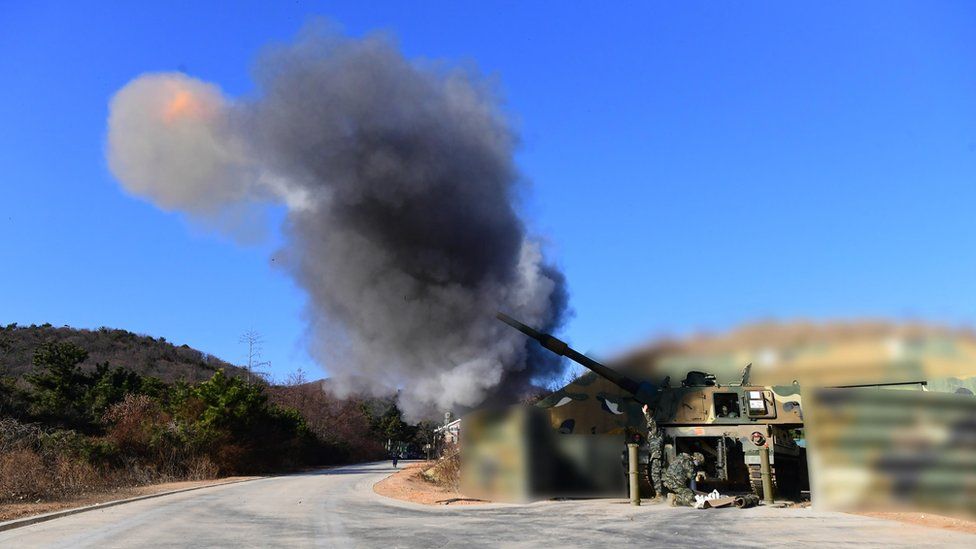
North Korea has also claimed a test of a new solid-fuelled missile, and its underwater attack drones, which can supposedly carry a nuclear weapon, since the start of January.
They follow on from two years of near-monthly missile launches and weapons development in blatant contravention of UN sanctions.
However, it was his announcement of formally abandoning the goal of unification that last week furrowed brows. Reuniting with the South had always been a key – if increasingly unrealistic – part of the North’s ideology since the inception of the state.
“This is a big deal. It fundamentally alters one of the regime’s core ideological precepts,” says Peter Ward, a senior researcher at Kookmin University in Seoul.
Kim Jong Un would now be tearing down that legacy – literally. Along with shutting diplomacy channels and cross-border radio broadcasts, he has announced he will demolish the Reunification Arch, a nine-storey monument on the outskirts of Pyongyang.
The arch, showing two women in traditional Korean dress reaching towards each other, had been built in 2001 to mark his father’s and grandfather’s efforts towards the goal of reunification.
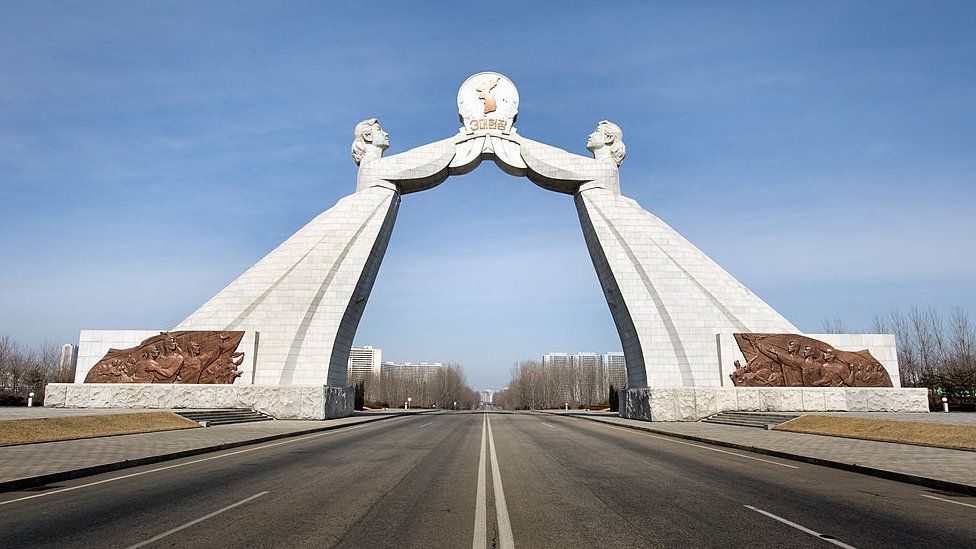
Kim Il Sung had been the one who went to war in 1950, but he was also the one who set the idea that at some point North Koreans would be united with their southern kin again.
But his grandson has now chosen to define South Koreans as different people altogether – perhaps to justify them as a military target.
A limited strike on the cards?
Mr Carlin and Dr Hecker, the analysts who predicted war, have interpreted all of this as signs that Kim Jong Un has settled on actually pursuing a fight.
But most analysts disagree. Seong-Hyon Lee, from the George HW Bush Foundation for US-China relations, points out the country is due to reopen to foreign tourists next month, and it has also sold its own shells to Russia for war – something it could ill afford if it were preparing for the battlefields.
The ultimate deterrent, however, is that were the North to launch an attack, the US and South Korea armies are just so much more advanced.
“A general war could kill a lot of people in the South, but it would be the end of Kim Jong Un and his regime,”says Kookmim University’s Mr Ward.
Instead, he and others warn the conditions are building for a smaller action.
“I’m much more concerned, in general, about a limited attack on South Korea… an attack of that sort would take aim at South Korean territory or military forces but be limited in scope,” says analyst Ankit Panda, from the Carnegie Endowment for International Peace.
This could even be in the form of shelling or attempted occupation of contested islands west of the Korean peninsula.
In 2010, the North struck the island of Yeonpyeong killing four South Korean soldiers, infuriating the South.
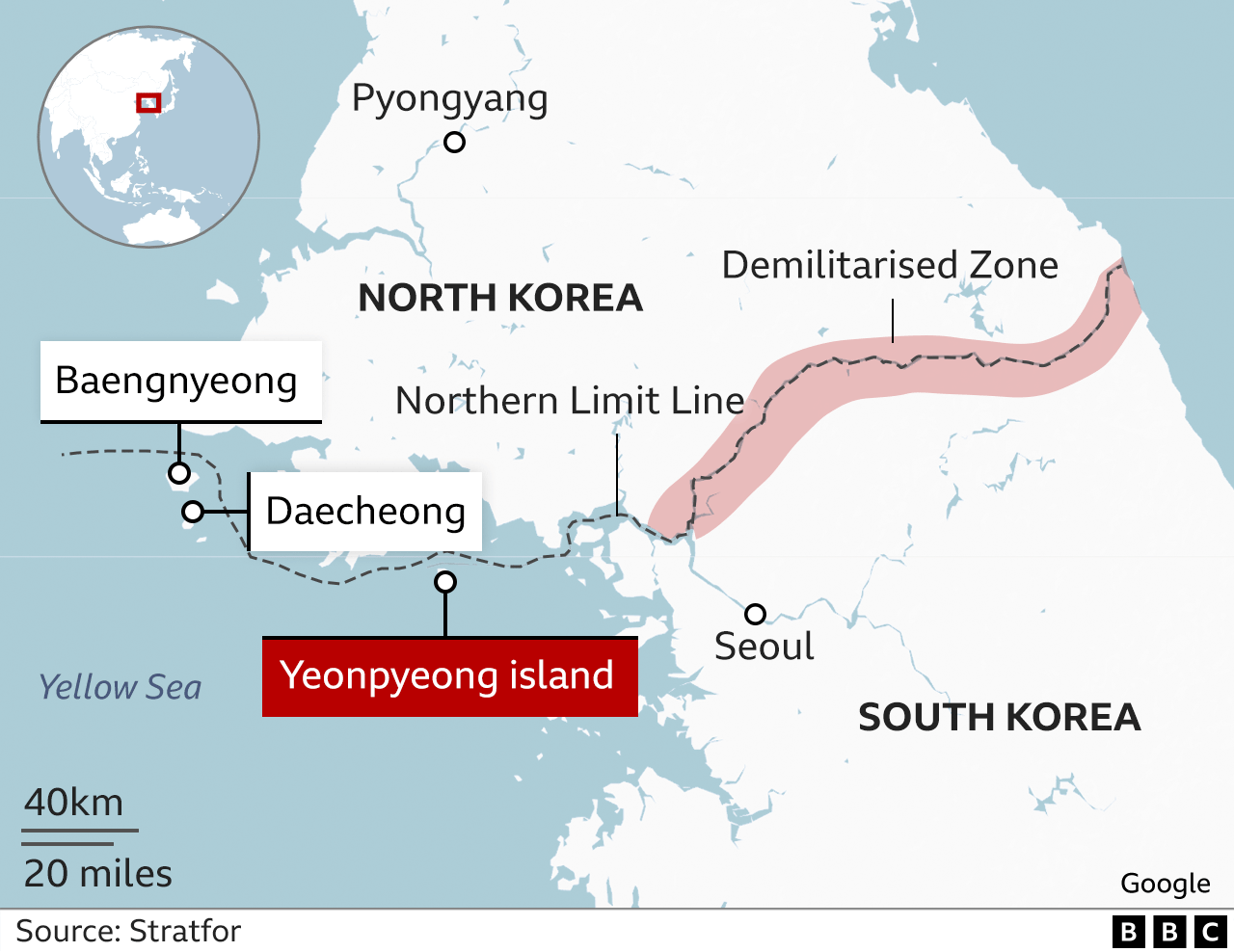
A similar provocation again could be done to test the South Korean’s limits, analysts suggest, and to push the buttons of President Yoon Suk Yeol, a defiantly hawkish leader who has vowed to respond to a North Korean attack with punishment “multiple times more severe”.
“North Korea may expect to draw out a disproportionate retaliatory attack from Seoul,” says Mr Panda, something that might spark a broader escalation in fighting.
Playbook move for leverage
Others say war fears should also be put in the context of Kim’s operating patterns.
“Looking at the history of North Korea, it has often used provocation to attract the attention of other countries when it wants to negotiate,” says Seong-Hyon Lee.
The regime continues to suffer from economic sanctions and 2024 is an election year for its enemies – with the US presidential vote and South Korean legislature poll.
“This presents a good opportunity for Kim Jong Un to provoke,” explains Dr Lee.
The current US administration under President Joe Biden – tied up with Ukraine and Gaza – hasn’t paid North Korea much heed and Pyongyang has also typically had most engagement with Republican administrations.
Kim Jong Un and Donald Trump famously had a bromance in 2019 before the denuclearisation talks soured – and the North Korean leader may be waiting for the former US president to return to the White House, where he might weaken the alliance with South Korea and be open to dialogue again.
North Korea’s closer friendship with Russia and continued economic support from China in the past year may have also boosted its audacity, analysts suggest. It’s received technical help from Russia to achieve a long-term goal of launching its spy satellites and the two states had several high-profile meetings including a leaders summit last year.
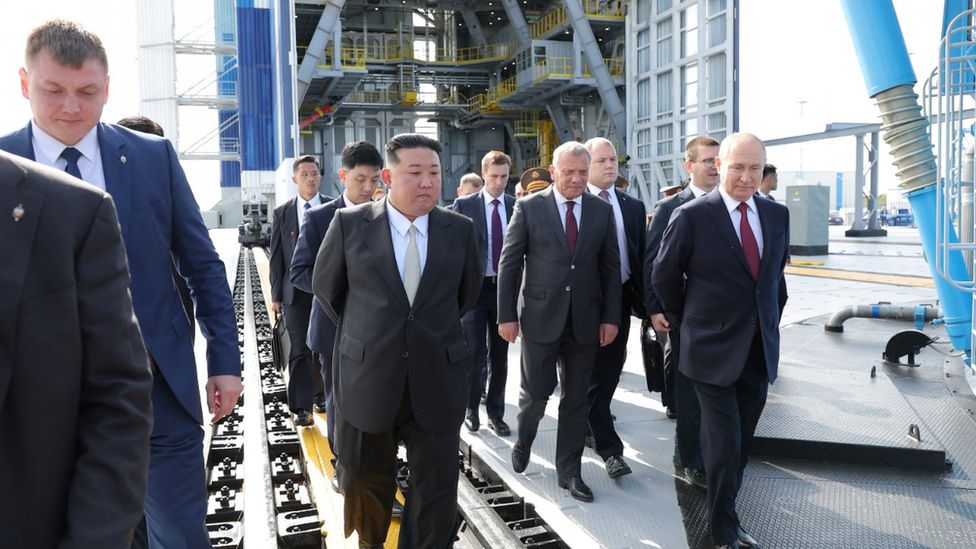
“Much of what we’re seeing is a result of broader North Korean confidence in its own capabilities and its geopolitical position given Russian, and to a lesser degree, Chinese support,” says Mr Panda.
Domestic goals
And others say Kim Jong Un’s behaviour is all aimed at stabilising his own regime.
“This appears to be an ideological adjustment for regime survival,” argues Leif-Eric Easley, an associate professor of international studies at Ewha University in Seoul. “North Koreans are increasingly aware of their Communist country’s failings compared to the South.”
He suggests a policy focused on defining the enemy justifies Mr Kim’s missile spending at a time where there are reports of starvation across the country.
Presenting the South as the enemy also makes it easier to resolve “cognitive dissonance at the heart” of the North’s view on South Korea, points out Mr Ward.
“Previously it was an indelibly evil state that was supposed to be the object of unification with a hopelessly corrupting culture that should not be consumed under any circumstances but with people who need to be liberated from their evil government,” says Mr Ward.
“Now the country and its culture can just be branded evil and that justifies the continued crackdown on South Korean culture.”
“He doesn’t actually want a war – a huge gamble where he would have “nothing to gain and everything to lose”, says Sokeel Park, from Liberty in North Korea, an NGO helping North Korean refugees.
His threats are instead aimed at cementing his new North and South policy, designed ultimately to shore up his power at home, he says.
While it’s important for South Korea, the US and allies to prepare for the worst-case scenario, it is also worth a thorough examination of the internal situation in North Korea and the wider geopolitics, analysts say.
At the end of the day, the best way to find out what the North’s leader is thinking is to engage with him, argues Dr Lee.
“The international community does not see the US talking to Kim Jong Un as surrendering to Kim Jong Un’s threats. It is seen as a necessary means to achieve a goal,” he says.
“If necessary, one should consider meeting with the leader of an enemy nation to reduce misjudgements and prevent war.”
With reporting by Kelly Ng
Related Topics
-
-
31 December 2023
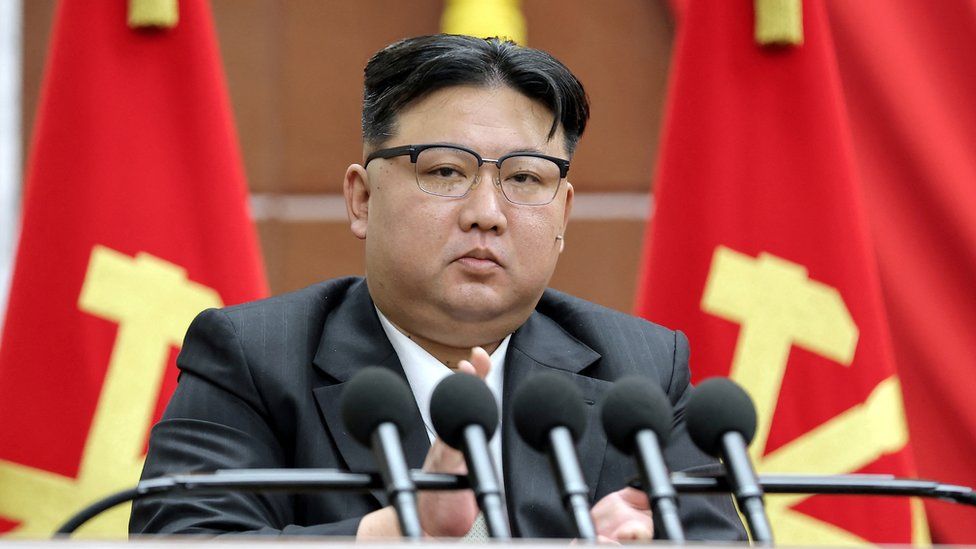
-
-
-
18 December 2023
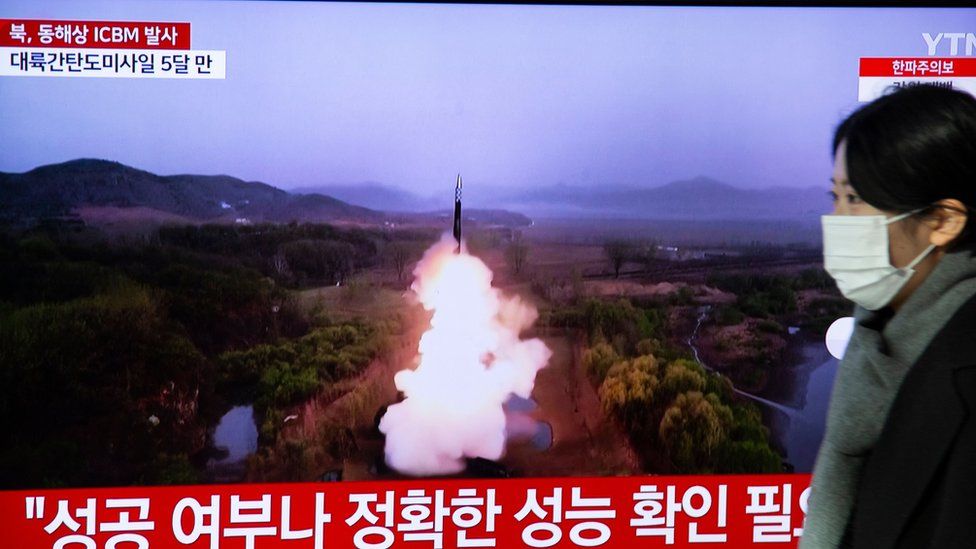
-
-
-
29 November 2023
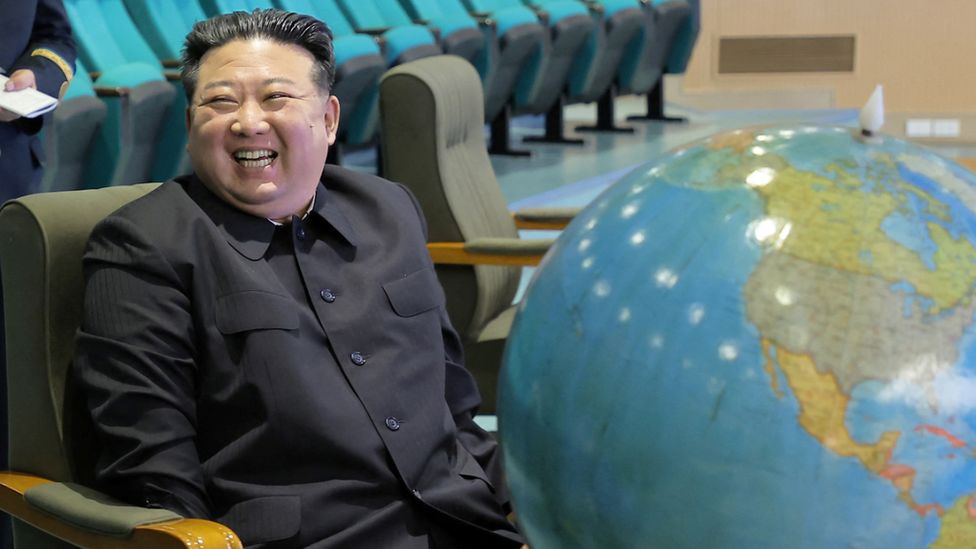
-
Celebrity beauty files: Singer-model Iman Fandi reveals her skincare secrets and what true beauty means to her

My biggest concern was stepping out of my parents’ shadows. By just being me and pursuing my dreams, I believe I have done that to an extent. I have also accepted the fact that no matter what I do or don’t, people will always have an opinion. I have learnt to just do what I love, keep going forward and surround myself with the people who I care about and support me.
WHAT WAS YOUR FIRST MODELLING EXPERIENCE? HOW DID IT HELP YOU AS A MUSICIAN AND A YOUNG WOMAN GROWING UP?
When I was younger, I was definitely more shy and introverted than I am now, but modelling, fashion and photography fascinated me in ways I could not describe. I just knew it was something I wanted to pursue.
I used to do shoots with mum when I was younger and along the way, I became comfortable in front of the camera. I started modelling independently when I was 14, I remember being a little awkward and shy at first but after being around the crew and getting to know everyone, modelling became second nature to me. It took some time (for me) to learn my best angles and poses but I will say that it’s something I’ll always enjoy doing.
I think modelling has helped me better portray the characters in the songs I create because it is similar to acting where I get to embody the person I want to portray and show the story I want to tell.
DID YOUR MODEL MUM TEACH YOU ANYTHING ABOUT TAKING CARE OF YOUR SKIN AND APPEARANCE?
My mum never forgets to remind me that proper cleansing after shoots is essential to caring for my skin. While I enjoy wearing make-up, I was never someone who would wear it if I didn’t need to. I’ve also learnt that eating healthy and drinking plenty of water also counts (as caring for my skin).
Heart of the Matter Podcast: Lazada layoffs – How far can unions help workers?

E-commerce giant Lazada’s retrenchment exercise resulted in criticism of how it was handled, including its lack of consultation with the union. But what role can unions play when companies need to let employees go and what happens when employers don’t fulfill their tripartite obligations?
Steven Chia sits down with Patrick Tay, assistant secretary-general of the National Trades Union Congress and Sim Gim Guan, executive director of the Singapore National Employers Federation.
Pheu Thai tables bill to alter charter provision on referendum
PUBLISHED : 23 Jan 2024 at 05:22

The Pheu Thai Party has tabled a bill to change a constitutional provision governing a referendum for charter amendment to parliament, deputy party leader Chusak Sirinil said.
He said that the charter amendment bill signed by 122 Pheu Thai MPs was submitted to parliament president Wan Muhamad Noor Matha last Thursday.
But if the parliament president refuses to put the bill on parliament’s agenda and says the bill attempts to write a new constitution which requires a referendum to be held first, this would lead to a conflict over parliament’s power as Pheu Thai believes that lawmakers possess full authority to amend the charter, Mr Chusak.
If the parliament president refuses, Pheu Thai MPs will ask the Constitutional Court to rule on whether MPs have such authority, Mr Chusak said, adding that the party is also seeking the court’s ruling on how many referendums on charter amendment should be held.
The proposal to revise the military-sponsored 2017 constitution, which was one of the ruling party’s election pledges, is listed as a priority issue for the coalition government.
The referendum is a thorny issue thanks to a 2021 Constitutional Court ruling that the public must approve any move to amend the entire charter. If a rewrite is approved, another referendum must be held to approve the content.
The government previously set up a committee to draw up new guidelines for holding a referendum to find common ground on how the 2017 constitution should be amended.
It is chaired by Deputy Prime Minister and Commerce Minister Phumtham Wechayachai.
Mr Phumtham’s panel recently approved a proposal to hold three charter amendment referendums and decided that only one question would be asked in the first one.
The question will be whether or not voters agree with the proposal to amend the constitution, except for Chapters 1 and 2, which deal with general provisions and the King, respectively.
The three referenda will cost 10.5 billion baht, he said.
However, Mr Chusak said on Monday that Pheu Thai’s working panel on charter amendment has agreed that only two referendums should be held as this will help save money and time.
Paetongtarn wants Olympic sport status for Muay Thai

PUBLISHED : 23 Jan 2024 at 05:16
Paetongtarn Shinawatra, the deputy chairperson of the National Soft Power Strategy Committee, is pushing to have Muay Thai become an Olympic sport.
Ms Paetongtarn outlined her goals in strengthening Muay Thai’s position as one of Thailand’s soft power tools through several strategies, including being included in the Olympics.
“We will get the opportunity to cheer on Muay Thai boxers representing Thailand in the Olympics one day,” she said via Facebook.
Ms Paetongtarn said she and her team would seek to make Muay Thai more popular among foreigners through other initiatives, such as incorporating a ranking system similar to Taekwondo’s belt ranking system.
She also talked about ways to aid Muay Thai teachers in becoming more professional and how to foster more Muay Thai competitions at all levels.
She also spoke of ways to boost the number of overseas Muay Thai camps and further promote the Muay Thai equipment industry, which would all add to the mix of maximising the national sport’s potential.
Meanwhile, the advisor to the prime minister and chairperson of the Sports Sub-Committee in the National Soft Power Strategy Committee, Pimol Srivikorn, said the government had made significant progress in promoting Muay Thai as a soft power.
As part of that, Mr Pimol met with Bangkok governor Chadchart Sittipunt last week to discuss a plan to send Muay Thai teachers to a number of schools in Bangkok.
He said a memorandum of understanding (MoU) made with the Bangkok Metropolitan Administration (BMA) will be signed on Jan 29.
The MoU will allow the soft power committee to send Muay Thai teachers and equipment to up to 20 schools under the BMA participating in a pilot programme starting next semester.
Mr Pimol said the committee was also looking to organise a Muay Thai masterclass in England, which would allow foreigners to learn the martial art from internationally recognised Muay Thai masters, such as Rodtang Jitmuangnon, Buakaw Banchamek and Superbon Singha Mawynn for one full day in April.
He said the masterclass would inspire these foreigners, prompting them to invite their friends to visit Thailand, which would, in turn, boost Thai tourism.
Backlash hits gang after latest assault

PUBLISHED : 23 Jan 2024 at 05:15
Nonthaburi: An adviser to the interior minister and founder of the Sai Mai Tong Rod (Sai Mai District Must Survive) Facebook page, Ekapop Luengprasert, on Monday took the mother of a 13-year-old boy who had been brutally beaten by a youth gang in this Central Plains province to file a complaint with Ratthanathibet police.
Mr Ekapop said the incident took place on Jan 10. The leader of the so-called Sai Thong gang, also known by the name of its leader, Tee Tha Sai, and seven other members assaulted Ms Chatmongkot’s (surname withheld) son at a local public park near Samakkhi Road over a problem with his ex-girlfriend, who is a gang member.
Mr Ekapop said Ms Chatmongkot’s son suffered a broken nose, a ruptured eardrum, a pulmonary haemorrhage and other severe wounds. The doctor said he would require surgery to make a full recovery.
Ms Chatmongkot said the gang members had told his son not to tell his mother about the beating, but he had eventually told her the truth.
She also revealed that her son had later received a death threat from the gang, saying they would burn their house. That was why she took her son to meet with Mr Ekapop and asked him to help seek justice.
Pol Col Pisut Chantharasuwan said he would ask his investigators to look into the case immediately and would set up a special team to hunt down and capture gangs of teenage thugs, especially the Sai Thong gang, who have been making trouble for locals for several years.
Earlier on Monday Mr Ekapop, along with his team, visited Sai Thong village, which is known to be the gang’s stronghold, and inspected the area where Tee Tha Sai was reported to have terrorised locals and their children.
According to one victim, who called himself Poom, the gang consists of more than 100 members ranging from teenagers to the elderly. They tended to beat random victims, use guns and grenades and get into fights to increase their notoriety.
Another victim, Wanchai, aged 80, said that the gang had been around for more than 30 years and that the police had never taken the matter seriously and consistently ignored complaints by victims.
Following his meeting with Mr Ekapop, Police Superintendent Pisut Chandrasuwan said he was going to form a special team to hunt down and capture the gang.
Want to place your CPF savings in a fixed deposit? Here’s what you need to know
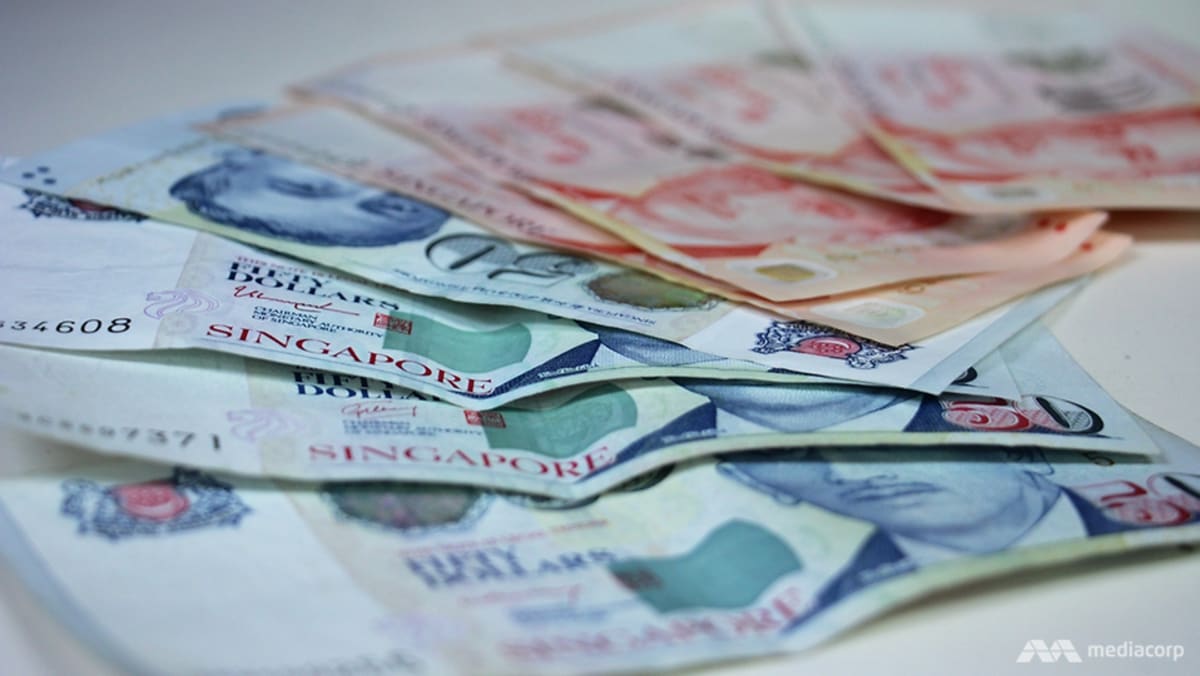
ARE THERE OTHER OPTIONS?
An alternative is Treasury bills (T-bills), which are short-term debt securities issued and backed by the Singapore government.
These government securities became a hit among retail investors over the past two years as yields shot up in line with the aggressive rate hikes pursued by central banks.
T-bill yields hit a more than 30-year high of 4.4 per cent in December 2022, but have since come down to mostly hover around the 3.7 to 3.8 per cent range amid a shift in interest rate directions. For example, the latest six-month T-bill auction on Jan 18 had a cut-off yield of 3.7 per cent.
Still, that is much higher than the fixed deposit offerings by banks. T-bills also have a lower minimum investment sum of S$1,000.
But some investors may prefer fixed deposits over T-bills given the certainty of returns, said Mr Wong.
T-bill yields are determined by an auction process. While interest rate trends help to chart a general trajectory, yields can also be affected by demand and supply dynamics, he added.
This is because in a T-bill auction, up to 40 per cent of the total issuance amount will first be allotted to non-competitive bids. The rest of the issuance amount will be awarded to competitive bids, starting from the lowest to the highest yields submitted.
The highest accepted yield among the successful competitive bids determines the cut-off yield for that auction.
Mr Aizat said T-bills remain a favourable option but with yields likely to trend lower, it may be time for investors to reduce the weightage of these government securities in their portfolios.
Beyond fixed deposits and government securities like T-bills, CPF members can also invest in unit trusts, investment-linked insurance products, funds and shares approved under the CPF investment scheme.
There are limits on the amount investors can put into stocks and gold – at 35 per cent of one’s investible savings in stocks and 10 per cent in gold.
Given that these are more risky assets, investors should know their own financial goals and risk appetites. Investing in a diversified manner is another good rule of thumb, said Mr Aizat.
Investors should also understand macroeconomic trends and study the impact on individual sectors or companies to make a sound decision, he added.
MP calls for tour of Prayut’s residence

A House committee is set to discuss a fellow panel member’s request for a tour of the residence of former premier and privy councillor Prayut Chan-o-cha, which has drawn a backlash from critics.
Wiroj Lakkhanaadisorn, a Move Forward Party (MFP) list MP and chairman of the House committee on military affairs, said on Monday he would propose the request by Jirat Thongsuwan, an MFP MP for Chachoengsao, for discussion in the panel. Mr Jirat was calling for access to film Gen Prayut’s residence to see how he is living now his time as prime minister has ended.
The MFP criticised Gen Prayut during his tenure as prime minister for living at a house in a military compound in Bangkok. Gen Prayut, a former army chief, has remained there despite leaving the premiership, citing security reasons.
Mr Jirat also pressed for scrutiny of the armed forces’ spending and funds.
Mr Wiroj, a vocal critic of the military, said Mr Jirat’s request is a matter to be discussed and decided upon by the panel.
Earlier, Akaradej Wongpitakroj, spokesperson of the United Thai Nation (UTN) Party, a coalition party closely linked to Gen Prayut, said while he welcomed the MFP’s proposed scrutiny, the main opposition party should expand its probe to all state agencies.
He also said Mr Jirat should better understand his role and power as an MP and House committee member, or he risks running the panel into disrepute for overstepping his mark.
Also, Jirayu Huangsub, the Defence Ministry spokesperson, said he was afraid it would not be appropriate to grant filming access to Gen Prayut’s residence as he now serves on the privy council and is a highly respected figure in the country.
Mr Jirat’s proposal also drew flaks from Thanakorn Wangboonkongchana, UTN deputy leader and the party’s list MP, who insisted Gen Prayut should be left alone as he is no longer involved in politics.
Mr Thanakorn added that the issue surrounding Gen Prayut’s residence had been settled with the Constitutional Court’s ruling that the former premier was rightfully occupying the house.
The army also said Gen Prayut had complied with regulations governing the occupation of a military house.
“I can see that the MFP is pursuing its agenda to reform the armed forces and is all fired up to achieve the goal,” Mr Thanakorn said.
“However, Mr Jirat should know there is a time and place for everything and for him to think it through before mincing words,” he said.
“What is the motive behind the move (to put Gen Prayut on the spot)?” Mr Thanakorn asked.

